Key takeaways:
- Baking timing is crucial; even slight deviations can lead to undercooked or overbaked results.
- Understanding your oven’s unique characteristics and adjusting recipes accordingly can improve baking outcomes.
- Environmental factors, such as humidity, significantly influence baking success and should be considered.
- Documenting baking experiences through a journal can help track effective timing adjustments for future reference.
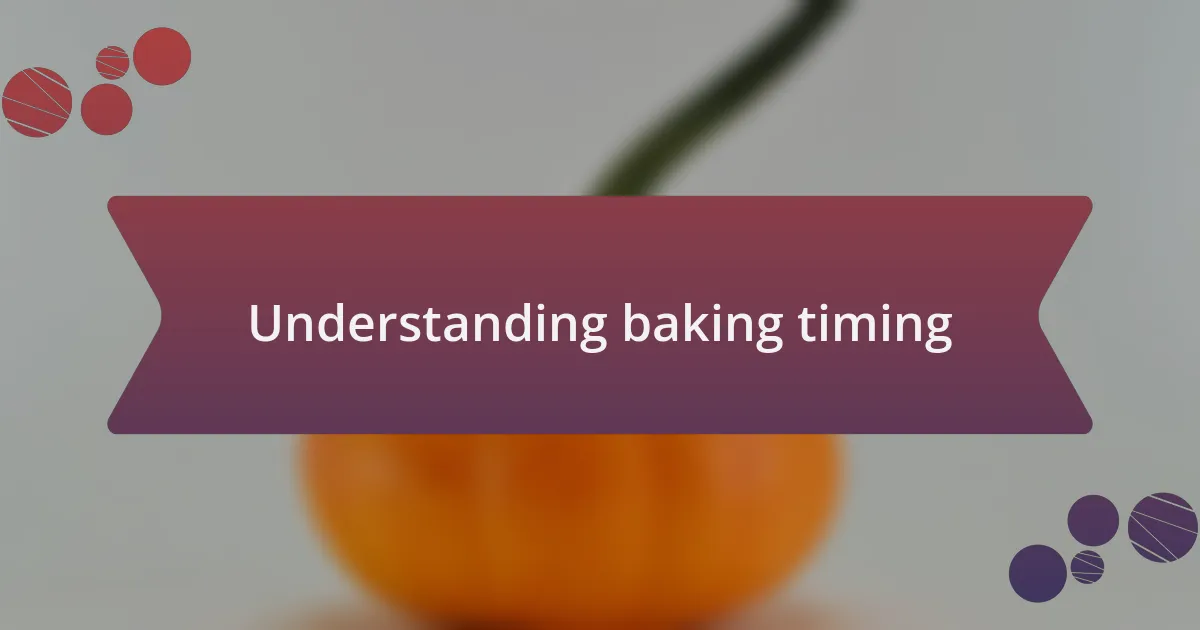
Understanding baking timing
Baking timing is often the unsung hero of the kitchen; it’s what separates a perfectly baked treat from a gooey disaster. I remember the first time I timed my chocolate chip cookies poorly. What started as a delicious dough quickly turned into a melted mess when I forgot to set a timer. Have you ever experienced that? The frustration of overbaking can really take the joy out of an otherwise delightful recipe.
One key to mastering baking timing lies in understanding how different ingredients interact with heat. For instance, I find that butter-heavy recipes tend to bake faster than those with more moisture, like banana bread. Knowing this has saved me countless baking sessions from certain doom. How often do you check the texture and color of your creation to gauge its readiness? I’ve learned that trusting my senses often leads to better outcomes than relying solely on the clock.
Moreover, each oven has its idiosyncrasies, which can affect baking times significantly. I’ve had experiences where my friend’s oven consistently runs hotter than mine, resulting in beautifully golden pastries in half the time. Isn’t it interesting how a seemingly small detail can change everything? Being aware of your specific oven’s quirks allows you to adjust your timing, ensuring that every bake is a success.
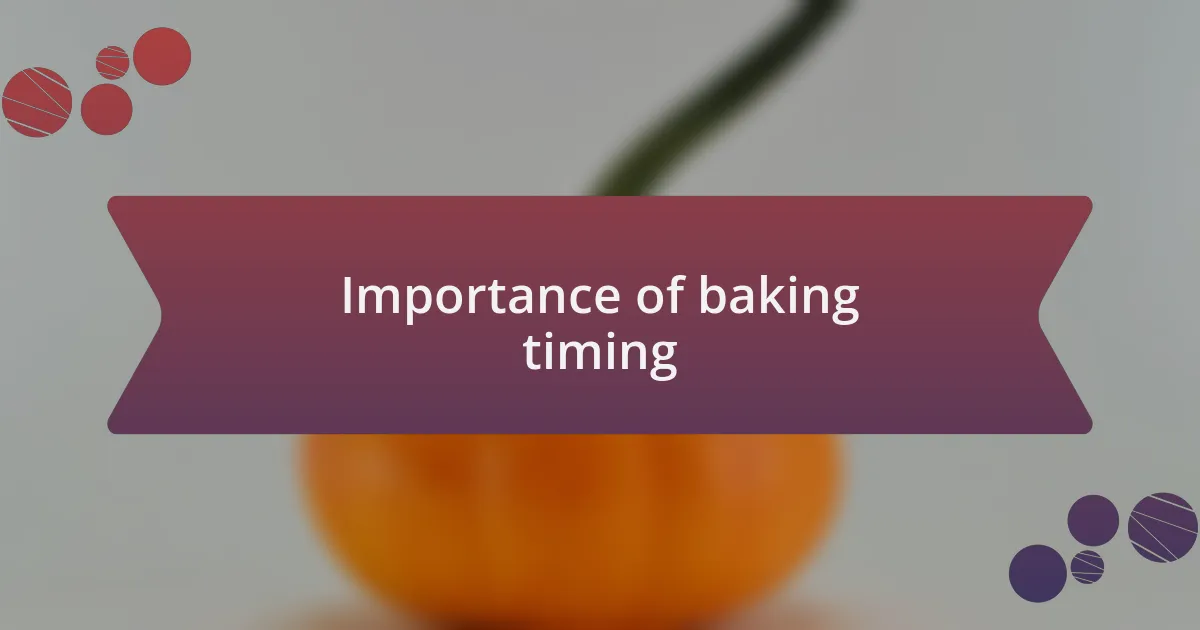
Importance of baking timing
Baking timing is essential because even a minute too long in the oven can transform a delectable dessert into a dry disappointment. I once attempted a layered cake that I thought would only need an extra couple of minutes to firm up. To my horror, I opened the oven door to find a beautifully risen cake that soon sank like my spirits. Have you ever felt that sinking feeling when you realize that you’ve crossed the line from perfect to overdone?
The science behind baking timing is fascinating, particularly how it varies with temperature. For example, when I made a batch of macarons, I learned that the humidity in the air influenced their success. They turned out beautifully on a dry day, but on a rainy afternoon, they spread out instead of puffing up perfectly. It’s astounding how external conditions can affect baking results, isn’t it?
Another critical aspect to consider is using a thermometer when necessary, especially for breads. I distinctly remember the first time I baked sourdough; I wasn’t confident in my timing, so I only relied on my instincts. Then I discovered the importance of an instant-read thermometer, which completely changed my approach. It was rewarding to finally pull out a loaf with a perfect crust and internal temperature, reaffirming that timing—and precision—truly matters in baking.
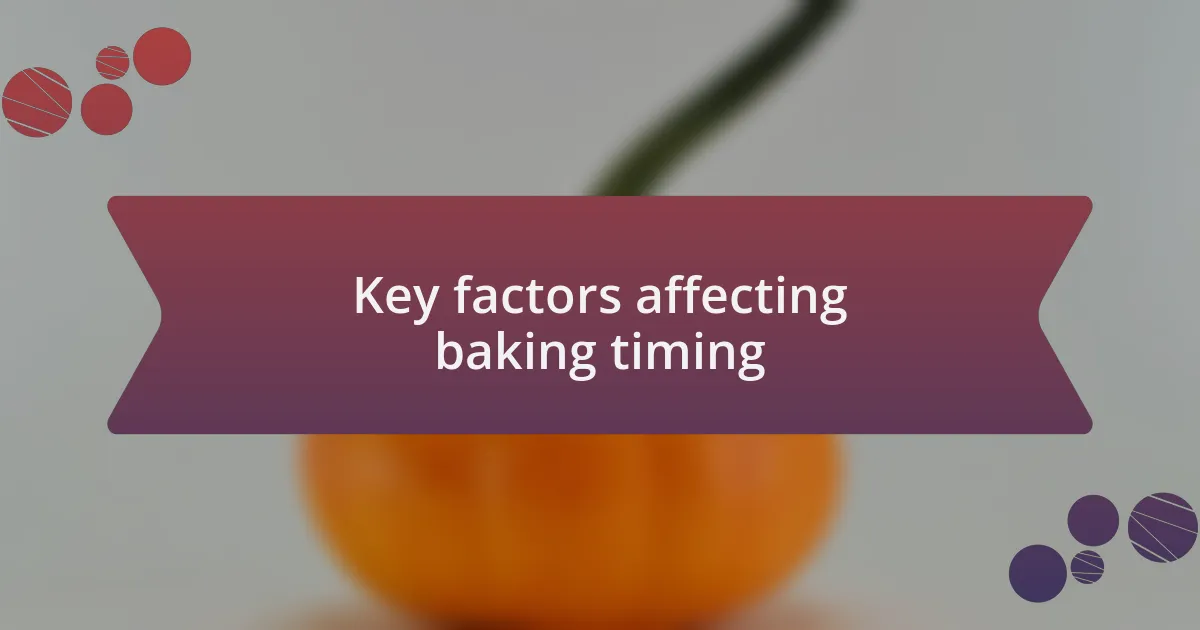
Key factors affecting baking timing
Baking is not just about a set time; it’s influenced by factors like oven calibration and the type of bakeware used. I recall a friend who swore by his vintage oven, claiming it baked evenly. However, when I compared our cakes, I noticed his were consistently browner on the edges. It made me think: how often do we accept that our oven may be underperforming without realizing it?
Another key player in baking timing is the recipe you’re following. On one occasion, I tried a cookie recipe that specified a baking time that seemed shorter than others. Trusting the recipe, I took them out too soon, only to have them spread out and not hold their shape. This made me wonder—how often do we assess our own ovens and adapt cooking times based on past experiences rather than strictly adhering to a recipe?
Lastly, the ingredients themselves can also play a significant role. For instance, I once substituted a different type of sugar in a pie recipe, thinking it would give a unique flavor. But the pie took much longer to set, and I was left staring at a soupy filling as my guests arrived. That day taught me that even a simple substitution can alter baking times dramatically, so it’s crucial to consider both the ingredients and the quantities when timing your bake.
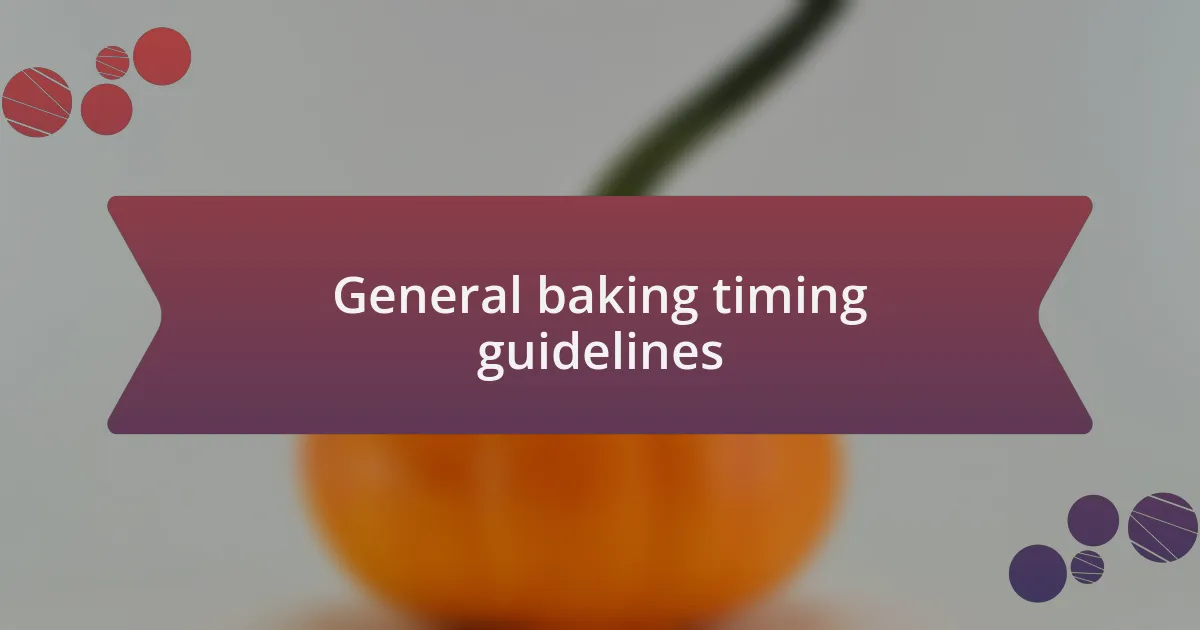
General baking timing guidelines
Baking timing can vary even within the same recipe, depending on the size and shape of your pans. I remember when I switched from a standard round cake pan to a taller one; it took almost double the time to bake through. Have you ever noticed how a slight adjustment in your bakeware can lead to unexpected results?
Another vital aspect is the oven temperature. A few degrees can mean the difference between a perfectly risen soufflé and a dense disappointment. I once set my oven to 375°F instead of 350°F while baking a batch of brownies, thinking a hotter oven would speed things up. Instead, I ended up with a crusty top and gooey insides. It makes you wonder—what’s the real cost of impatience in baking?
Lastly, the environment in which you’re baking is crucial. I recall a summer day when the humidity soared, affecting my bread dough’s rise time. I had to adjust my expectations and trust the process rather than sticking rigidly to the clock. Have you ever baked in different seasons and noticed how the weather plays a role? It’s fascinating how timing goes hand in hand with our surroundings.
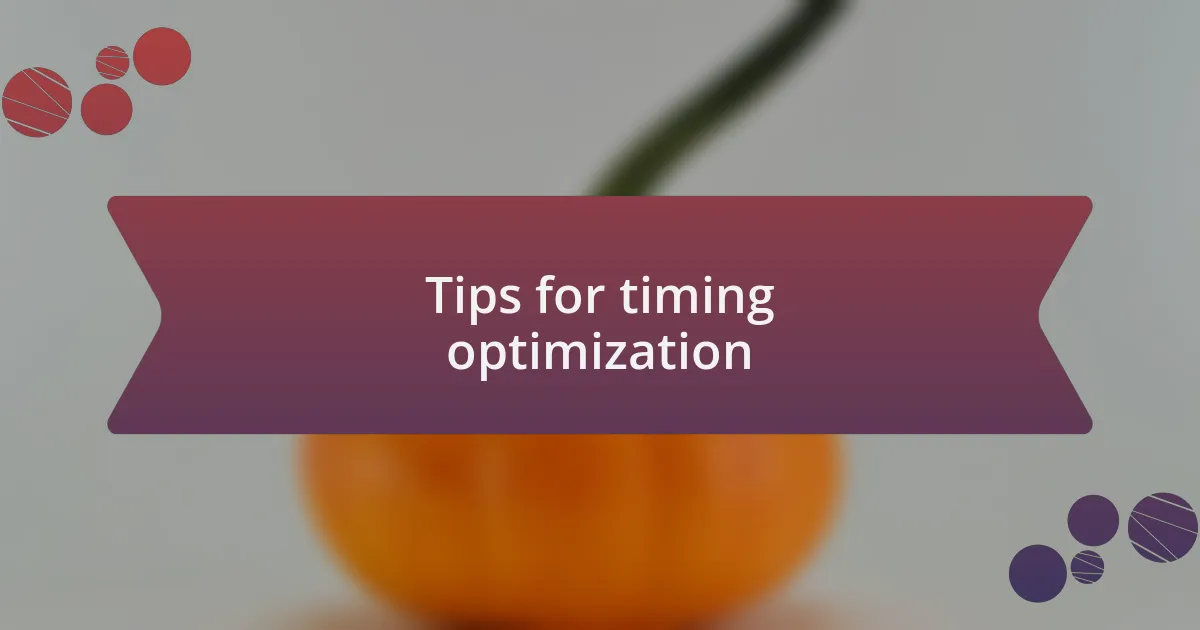
Tips for timing optimization
When it comes to optimizing timing in baking, I find that preparation is key. I always measure and prep my ingredients before even turning on the oven. This not only ensures that everything flows smoothly but also allows me to gauge how long certain tasks will take, like preheating my oven or blending ingredients. Have you ever felt rushed and left out a crucial ingredient because you were scrambling at the last minute?
Another tip I swear by is using a timer effectively. I might set multiple timers for different stages of my baking process, such as one for mixing and another for baking. I remember the time I forgot about a batch of cookies because I only had one timer going. I learned that staying aware of not just the end time but also each key step helps avoid mishaps. It’s a small habit, but it can transform how you manage your baking time.
Lastly, I recommend keeping a baking journal to track which timing adjustments worked best for different recipes. I started jotting down notes after experiencing a lovely cake turn out perfectly one day and a complete flop the next. It became clear that the time I left it in the oven, even a minute or two, made all the difference. Have you ever thought about how much you could learn just by reflecting on your own baking experiences? You’ll be amazed at the insights you can gather over time.
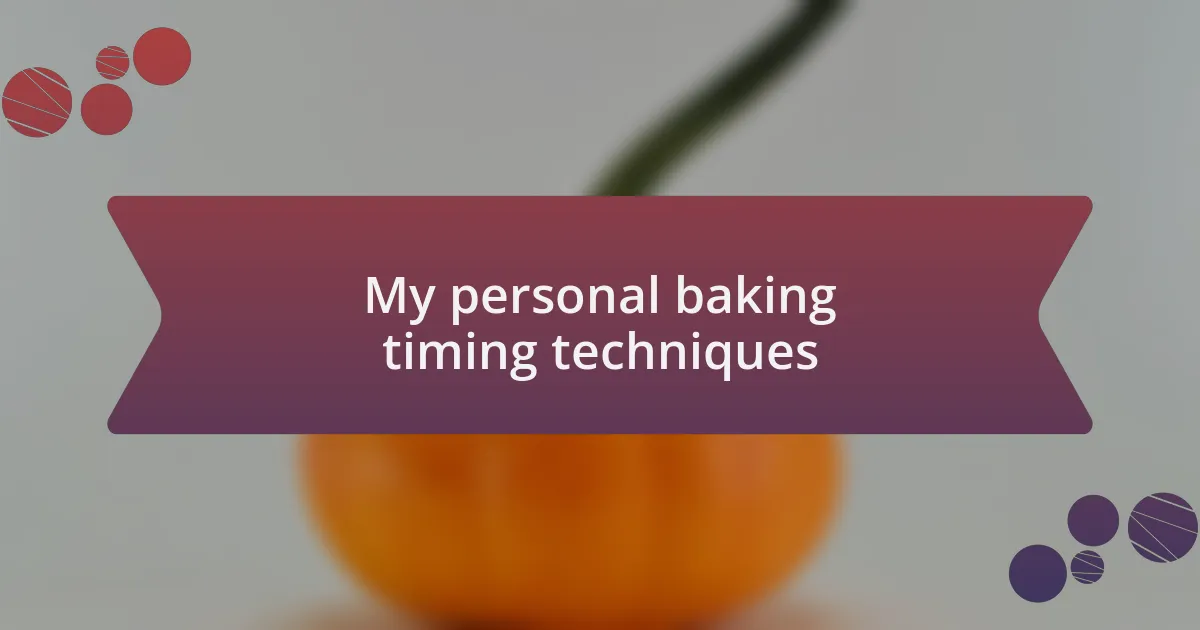
My personal baking timing techniques
One of my favorite baking timing techniques is to create a rhythm in the kitchen. I break my process into small, manageable steps and assign specific time frames to each. For instance, while the oven preheats, I’ll combine dry ingredients and clean as I go. This approach not only keeps me organized but also makes baking feel less overwhelming. Have you ever found yourself frazzled because everything seemed to need your attention at once?
One thing I’ve learned over the years is to embrace flexibility with timing. Sure, I have a general idea of how long things take, but each recipe has its quirks. I always check for doneness a few minutes early, especially with cakes and breads. The moment when a skewer slides out clean can be so thrilling—it’s like a little victory after all the meticulous measuring! Doesn’t it feel great to discover something that works perfectly for you?
When I try a new recipe, I make it a point to note not just the baking time but also the ambient conditions, like humidity or altitude. These factors can significantly influence how a recipe turns out. I remember baking macarons—what a challenge! I realized that the humidity on that particular day led to a less-than-perfect batch. Thus, reflecting on these experiences helps me fine-tune my baking timing and foster a deeper understanding of the craft. Have you considered how environmental factors play into your baking successes and failures?
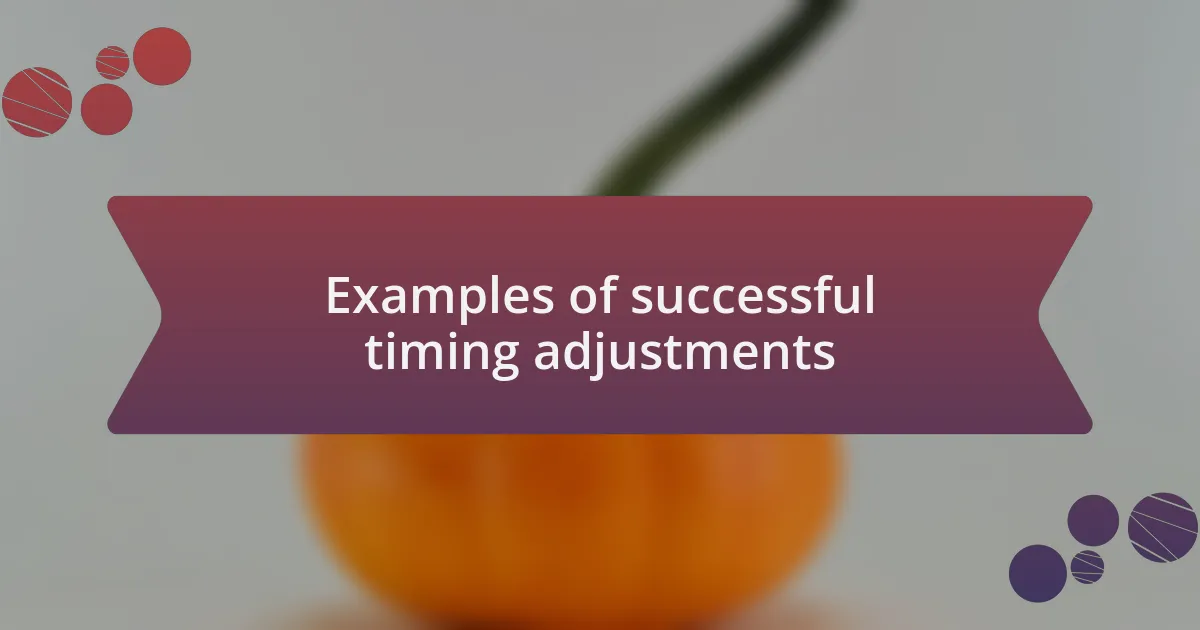
Examples of successful timing adjustments
One time, I was baking brownies for a gathering and miscalculated the baking time by five minutes. Instead of pulling them out right at the prescribed time, I decided to give them an extra couple of minutes as I noticed they looked a bit too soft. That simple adjustment made all the difference—they turned out gooey and fudgy, just the way everyone loves them. Have you ever adjusted a timing just out of instinct and found it led to something unexpectedly delightful?
I’ve often found myself in sticky situations with cookies, especially when I’m experimenting with different add-ins like nuts or dried fruit. A few months ago, I forgot to take my cookies out of the oven on time. Instead of hard little discs, what emerged were chewy, caramelized treats that were a hit at my workplace. Isn’t it fascinating how a little timing adjustment can lead to a completely new, delicious outcome?
When I’m trying out a recipe that feels a bit daunting, like a soufflé, I always set a timer. Yet, I’ve learned not to rely solely on it. The first time I made it, I pulled it out, somewhat anxious, only to find that a little extra time in the oven created a lighter, airier texture than I initially thought possible. It made me realize that listening to my instincts, in tandem with the clock, can lead to incredible baking revelations. What’s your proudest timing achievement in the kitchen?